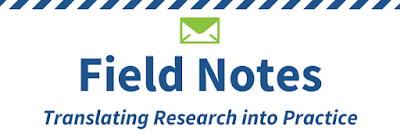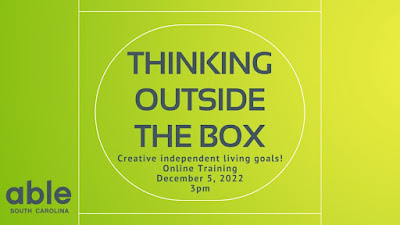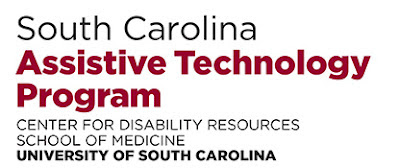- 2 pieces of paper
- Paints (acrylics, watercolors -- even a kids set will work)
- Brush
- Water
- Paper Plate to squeeze paint onto, if using tubed paint
- Rag/Paper Towel
- Crayons, Chalk, Pastels, and Markers work too -- it will just look a little different (and different is great!)
Welcome to the Center for Disability Resources Library Blog! Here we will welcome your comments and suggestions about books and videos that you have borrowed, materials that you would like to see purchased, or anything involving the day-to-day operations of the library or even of disabilities in general. Visit the CDR Library's web site!
Wednesday, November 30, 2022
FREE Webinar: Brain Injury Friendly Art Class with Allison Moir-Smith
Tuesday, November 29, 2022
Native American Heritage Month
Today, many people, groups, and organizations take this month to honor the many diverse contributions of Native Americans to cultural and economic practices in the United States. Native American Heritage Month is also a time when we highlight issues facing our Native communities.
Today, we are sharing more about the issues that impact Native Americans with disabilities.
Overview:
- There are 574 federally recognized American Indian & Alaska Native Tribes throughout the United States (Sources 5, 10)
- There are 324 federally recognized Native American reservations and land trusts in the U.S. as of 2022 (Sources 5, 11).
- South Carolina has one federally recognized tribe, the Catawba Nation, centered in York County (Sources 8, 9). Additionally, the state of South Carolina recognizes 9 local tribes and 4 tribal groups. (Source 8).
- Native Americans are expected to live 5.5 years less than other race populations in the US. They also have disabilities at a higher rate than any other racial group in America:
- 24% of American Indians and Alaska Natives have a disability compared 19% of the general population living with a disability.
Some issues facing Native Americans with disabilities include:
- High rates of poverty and unemployment
- Homelessness or living in overcrowded conditions – particularly dangerous during the COVID-19 pandemic
- Underfunded education systems which include a lack of accommodations for those with disabilities
- Violence against women – 84% of Native women report having experienced violence within their lifetime.
- Due to the history of exploiting Native lands, many Native Americans do not have good access to clean water and other natural resources.
- Limited healthcare funding and resources, culturally competent care, and historical trauma create barriers to healthcare access for Native Americans.
What resources are available?
We are our most powerful when we work together with our peers! Local and national tribal and Native American groups are working among their peers to address many issues of inequity for Native Americans with and without disabilities.
- The Catawba Nation’s website contains resources on tribal enrollment, scholarships for members, and other resources. The nation has also developed goals to increase access to housing, transportation, and supportive services for Native Seniors. More here: https://www.catawba.com/
- The Pine Hill Indian Community Development Initiative is a nonprofit working to increase access to health and resources for Native Americans in South Carolina. Learn more: https://www.phhn.org/
- Native American Disability Law Center : although this organization maintains a list of comprehensive resources on its website. You can find:
- Services for Native people over 18 with developmental and intellectual disabilities
- Education rights for Native children with disabilities
- Legal services for Natives with mental illness
- Information on social security benefits for disabled adults and children
- National Indian Education Association works to improve schools and education for Native populations
- Native Women’s Wilderness advocates for Native women by assisting women and girls with finding their leadership skills. They also support the education and exploration of Native lands by Native women and girls.
Able South Carolina also encourages you to listen to and support Native voices – research Native artisans and business owners in your area to support!
Resources:
- Indian Health Services Factsheets: Disparities. https://www.ihs.gov/newsroom/factsheets/disparities/ Accessed November 2, 2022.
- Centers for Medicare and Medicaid, AI AN and Disability
- Diversity Inc. The Biggest Issues Facing the Native American Community Right Now
- National Congress of American Indians, Disabilities
- United States Census Bureau Newsroom (2022), “Facts for Features: American Indian and Alaska Native Heritage Month, November 2022. https://www.census.gov/newsroom/facts-for-features/2022/aian-month.html#:~:text=National%20Population%20Projections-,324,-The%20number%20of
- United States Department of Health and Human Services and Office of Minority Health: Celebrate Native American Heritage Month. https://minorityhealth.hhs.gov/NAHM/?utm_medium=email&utm_source=govdelivery Accessed November 2, 2022.
- Sciway.net: South Carolina Indian Tribes: Native Americans in South Carolina. https://www.sciway.net/hist/indians/ Accessed November 3, 2022
- South Carolina Commission for Minority Affairs:South Carolina’s recognized American Indian Entities. https://cma.sc.gov/minority-population-initiatives/Native-american-affairs/south-carolinas-recognized-Native-american-indian-entities Accessed November 3, 2022.
- Catawba Nation website. https://www.catawba.com/
- United States Bureau of Indian Affairs (2021), Indian Entities Recognized by and Eligible To Receive Services From the United States Bureau of Indian Affairs https://www.federalregister.gov/documents/2021/01/29/2021-01606/indian-entities-recognized-by-and-eligible-to-receive-services-from-the-united-states-bureau-of
- American Indian Reservations,Statistical Areas, and Alaska Native Village Statistical Areas: https://www2.census.gov/geo/docs/maps-data/data/gazetteer/2022_Gazetteer/2022_Gaz_aiannhr_national.zip
Monday, November 28, 2022
AAIDD 2023 Conference "Call for Proposals" Closes Tonight!
The AAIDD 2023 Call for Proposals closes at the end of the day. The conference will be held June 5-8, 2023 in Pittsburgh, PA.
The AAIDD conference is the “must attend” conference of the year and features presentations in every area of research, practice, and policy in the field of intellectual and developmental disabilities.
The 147th AAIDD conference theme is Setting New Norms for Integrated & Competitive Employment: Challenges, Opportunities, Strategies. In addition to presentations and posters that address the theme, the AAIDD conference always showcases the emerging findings and promising practices across the field.
Submit your proposal now at https://www.aaidd.org/education/annual-conference/2023-call-for-papers!
Field Notes November 2022
Experiences of Korean Fathers of Children With Autism in the United States
An article published in the September Issue of Inclusion by the authors affiliated with the University of Maryland College Park and University of Illinois Chicago discusses a study that explored the essence of shared experiences of Korean fathers of children with ASD in the United States. (Free for AAIDD members. For non-members, the abstract is free of cost, full text access available with a fee)
An article published in the November Issue of the Journal of Policy and Practice in Intellectual Disabilities by authors affiliated with the Maria Grzegorzewska University and the University of Kansas discusses a study aimed to explore the experiences of mothers who care for adult children with profound ID. (Abstract is free of cost, full text access available with a fee)
An article published in the September issue of the Journal of Policy and Practice in Intellectual Disabilities by authors affiliated with the University of Illinois and Boston University discusses a study evaluating the effectiveness of a legislative advocacy program for parents of individuals with IDD. (Abstract is free of cost, full text access available with a fee)
Research and Community Engagement
It's Never Too Late: Debunking Myths About Communication and Adults With Severe Disabilities
An article published in the October Issue of Intellectual and Developmental Disabilities by authors affiliated with Georgia State University, Florida State University, Boston College, United States Society for Augmentative and Alternative Communication, Western Carolina University, and the American Speech Language Hearing Association discusses several myths about age, ability, and the experiences limiting opportunities for persons with severe disabilities. (Free for AAIDD members. For non-members, the abstract is free of cost, full text access available with a fee)
Examining Differences in Community Participation in Young Adults With Autism Spectrum Disorder
An article published in the September Issue of Inclusion by authors affiliated with Penn State Hershey Medical Center, Temple University, and Portland State University suggest that young adults participated in fewer areas and less frequently than peers without ASD. (Free for AAIDD members. For non-members, the abstract is free of cost, full text access available with a fee)
Lessons Learned From Research Collaboration Among People With and Without Developmental Disabilities
An article published in the October issue of Intellectual and Developmental Disabilities by authors affiliated with the University of Maryland, Boston University, and the University of Illinois discusses the lessons learned from a collaborative research study among researchers with and without DD using both qualitative and quantitative methods to develop and examine the effectiveness of a civic engagement intervention for transition-aged youth with disabilities. (Free for AAIDD members. For non-members, the abstract is free of cost, full text access available with a fee)
COVID-19
Public Stigmatization of People With Intellectual Disability During the COVID-19 Pandemic
An article published in the November issue of the American Journal on Intellectual and Developmental Disabilities by authors affiliated with Tilburg University and Radboud University discusses a study aimed to examine the level of discrimination against people with ID during COVID-19, and assessed stereotypes, levels of familiarity with the condition and personal experiences with COVID-19 as potential correlates. (Free for AAIDD members. For non-members, the abstract is free of cost, full text access available with a fee)
An article published in the November Issue of the Journal of Policy and Practice in Intellectual Disabilities by authors affiliated with the University of Wolverhampton, Linköping University, Manchester Metropolitan University, University of Alicante, University of New South Wales, TU Dortmund University, KTH Royal Institute of Technology, Stockholm, and the Université du Québec en Outaouais discusses how information and communication technologies have become more embedded than ever in people's lives and investigates how this change has affected the lives of people with ID. (Free for AAIDD members. For non-members, the abstract is free of cost, full text access available with a fee)
Tuesday, November 22, 2022
FREE Webinar: Brain Injury Friendly Art Class
BIASC is thrilled to announce that we are hosting a FREE webinar for Brain Injury Survivors! This webinar will be a guided art lesson by artist, Brain Injury Survivor, and Brain Injury Advocate Allison-Moir Smith.
Date: Wednesday, December 7, 2022
Time: 10 am - 11 am EST
Location: Zoom (register at the link below)
Cost: FREE
Supplies Needed:
Whatever you have available in your home. This art class uses supplies that you already have to provide a creative outlet in a way that caters to someone with a brain injury. You can use plain paper (no canvases required!) and any type of art medium you would like.
Paints are most fun, but whatever you have on hand at home will work!
You will need:
- 2 pieces of paper
- Paints (acrylics, watercolors -- even a kids set will work)
- Brush
- Water
- Paper Plate to squeeze paint onto, if using tubed paint
- Rag/Paper Towel
- Crayons, Chalk, Pastels, and Markers work too -- it will just look a little different (and different is great!)
Click Here to Register for this FREE Webinar.
You will receive an email with Zoom information after registering.
Monday, November 21, 2022
Thinking Outside the Box- Creative Independent Living Goals!
Registration will close on Sunday, December 4
For questions, contact Dori at dtempio@able-sc.org.
Friday, November 18, 2022
12 Home Products Recommended by Wheelchair Users
Thursday, November 17, 2022
Mobility Programs at Able SC!
Able SC in partnership with The COMET offers a number of Mobility Programs! Keep reading for details on our programs.
Questions?
Call 803-779-121
or email transportation@able-sc.org.
PUP (Pick Up Program):
- The PUP Mobility program is for anyone 65 and older or who has a disability. This is for people who live outside the COMET/DART service area, live in Richland or Lexington counties, and live inside the Columbia Urbanized area.
- Anyone who is eligible will receive a monthly allowance of $100 to use Lyft, Uber, or a taxi.
VTrip (Volunteer Transportation Reimbursement Program):
- The VTrip Mobility program is for anyone 65 and older or who has a disability. This is for people who live outside the COMET/DART service area, live in Richland or Lexington counties, and live inside the Columbia Urbanized area.
- Allows eligible riders to pay back the people who give them rides.
- The driver cannot be a family member. They can be a neighbor, friend, coworker etc.
- The reimbursement rate is 150 miles a month at 0.58¢ per mile or $58 a month.
Travel Training
The objective of travel training is to make using transit comfortable and familiar for new riders so they can travel independently within the community and participate in various leisure and/or professional activities. This is a free service that meets the specific transportation needs of passengers by offering a hands-on learning experience with a qualified transit professional.
To sign up for Travel Training, contact Able South Carolina at 803-779-5121 or email transportation@able-sc.org
Wednesday, November 16, 2022
SCATP Fall Events
Adapted Toy Workshop
Live Workshop this week!
It’s not too late to sign up for a time slot!
Date: November 17 & 18, 2022
Time Slots available: 1:00, 2:00, or 3:00
Cost: Free. (Registration is required.)
About the Workshop: Children learn through play; many children with disabilities do not have access to toys operate independently.
- Bring a battery-operated toy to adapt. If you do not have an appropriate battery-operated toy, one will be provided for you.
- Learn how to adapt toys and assemble a 3D printed switch.
- Everyone will leave with a switch adapted toy and 3D printed switch to operate it!
*****
Dispelling AAC Myths.
How do we know someone is appropriate for AAC?
Live Webinar
Date: December 1, 2022
Cost: Free. (Registration is required.)
About the Webinar
Integrating the use of AAC into everyday activities and the Gen Ed curriculum in an free, easy to follow step by step evidence based plan. This program is for AAC team (SLP’s, Parents, educators, and anyone else working with a child who would benefit from an AAC device).
Participants will learn:
- Dispelling AAC myths. How do we know when a device is right for the child/client?
- How do I get a device for my child/client?
- Your child/client has a device. Now what?
About the Speaker
Michelle Lassiter MA CCC/SLP is the Tobii Dynavox Solutions Consultant for the state of South Carolina. She has been a bilingual (Eng/Span) Speech Language Pathologist for over 25 years in hospital, early intervention, outpatient, and school settings.
Accommodations
CART captioning is provided for all SCATP webinars. If you need an additional accommodation to participate, please contact us at least one week prior to the webinar via e-mail or by phone at 803-935-5263.
Webinars are recorded and archived on our training page.
Tuesday, November 15, 2022
Don't miss out on this great Brain Injury training opportunity! Registration ends tomorrow!
|












